Best value France car hire from top brands








Key facts for hiring a car in France

Best time to visit France
France is so versatile that you can visit any time of the year and see something spectacular.

Useful French lingo
Give way – Cedez le passage
Slow down – Ralentissez

Car hire locations in France
easyCar offers over 500 car hire locations in France

Time difference in France
GMT + 1

French Currency
Euro (EUR, €)

Hire a car in France
France is famous for its romantic aura, its gastronomic delights and its acclaimed art.
From the war memorials of Normandy to the yachts of Monaco, France’s mesmerizing hold on its visitors gets stronger during every visit.
The country has such a diverse selection of landmarks, from the natural wonder of the Alps to the man made giant, Le Tour Eiffel, is it any wonder that France is the most visited country in the world? Whatever is on your holiday checklist, France will tick it off.
Frequently Asked Questions about Car Hire in France
Dreaming of exploring France’s stunning coastlines, historic cities, and picturesque villages at your own pace? Hiring a car is a fantastic way to unlock the freedom of the open road. But we know you might have a few questions before you prendre la route!
We’ve put together a comprehensive guide to the most popular and even some niche questions about car hire in France, all designed to make your journey smooth and stress-free. At easyCar, we partner with reputable local and international suppliers across France, offering you great deals in popular destinations like Paris (Charles de Gaulle, Orly), Nice, Lyon, Marseille, Bordeaux, Toulouse, and many more regional airports and city centres.
What documents do I need to rent a car in France?
To pick up your hire car, you’ll generally need:
A valid driving licence: This must be your original, physical licence. For non-EU visitors, an International Driving Permit (IDP) is highly recommended or sometimes required, especially if your licence isn’t in a Roman alphabet. It’s always a good idea to check this beforehand to be safe! Your licence generally needs to have been held for at least one year.
A credit card in the main driver’s name: Most rental companies require a credit card for the security deposit, which covers things like fuel or potential damages. Debit cards are usually not accepted for this purpose for the security deposit. Make sure the card has enough available credit.
A valid ID (like your passport): This is essential for identity verification.
It’s always best to have a copy of your car rental voucher or booking confirmation too.
How old do I need to be to rent a car in France? Are there any young driver fees?
The minimum age to rent a car in France is typically 19 years old, although this can vary by rental company and vehicle category. For example, some premium vehicles may require drivers to be 21 or even 25. Drivers under 26 years old will almost always incur a “young driver surcharge”, which is an additional daily fee. This fee is typically paid locally when you pick up the car. When you search on our price comparison website, you can enter your age to see relevant vehicles and fees associated.
There usually isn’t a strict maximum age, but some companies might have policies or “senior driver surcharges” for drivers over a certain age. Again, entering your correct age in the search will ensure all applicable fees and cars available are shown.
What are the fuel policy options for car rentals in France?
The most common fuel policies you’ll encounter are:
Full to Full: You pick up the car with a full tank and return it full. If you don’t return it full, you’ll be charged for the missing fuel plus a refuelling service fee. This is often the most cost-effective option if you plan to use a full tank.
Full to Empty (Pre-purchase): You pay for a full tank when you pick up the car. You are then expected to return it as empty as possible, with no refund for unused fuel. This option can be more expensive if you don’t use all the fuel, but offers convenience by avoiding the need to refuel before returning.
Partial options: Some suppliers might offer variations where you return the car with the same fuel level as picked up, and any difference is charged.
Always check the specific fuel policy when booking your vehicle and confirm again with the rental agent when you pick up the car.
What kind of car should I rent for my trip to France?
This really depends on your travel plans and the regions you’ll be visiting.
For city breaks (like Paris, Lyon, or Nice): A mini or economy car is often best. Their compact size makes them easier to navigate often narrow streets, find parking, and are fuel-efficient for urban driving.
For exploring rural areas, vineyards (like Bordeaux or Burgundy), or scenic drives: A compact or mid-size car offers more comfort, luggage space, and adequate power for longer journeys and varied terrain.
For family holidays or extensive luggage: An SUV or a larger family car (like a minivan) will provide the space and comfort you need for multiple passengers and significant baggage.
For a bit of luxury or a special occasion: France also offers a range of luxury cars and convertibles, perfect for cruising the French Riviera or a grand tour.
It’s worth noting that manual transmission (stick shift) cars are most common in France. If you prefer an automatic vehicle, make sure to book one well in advance, as they can be less available and sometimes cost more. You can easily filter for automatic vehicles on our easyCar price comparison searches.
What are the driving rules and regulations I should know for France?
France drives on the right-hand side of the road, and vehicles overtake on the left. Here are some key rules:
Speed Limits:
Motorways (Autoroutes): 130 km/h (reduced to 110 km/h in wet weather).
Dual Carriageways: 110 km/h (reduced to 100 km/h in wet weather).
Out of town roads (single carriageway): 80 km/h (reduced to 70 km/h in wet weather).
Built-up areas: 50 km/h.
Always look out for local signage as limits can vary, especially in areas with visibility less than 50m (where the limit is 50 km/h).
Seatbelts: Compulsory for all occupants, front and rear.
Children: Children under 10 years old must use an appropriate child restraint system and usually cannot travel in the front seat.
Mobile Phones: Illegal to use a handheld mobile phone while driving. Only a completely hands-free kit is allowed (earphone kits are not permitted).
Drinking and Driving: France has a strict limit of 0.05% blood alcohol content (0.02% for new drivers and bus/coach drivers). Penalties are severe, including immediate licence confiscation for serious infringements.
Headlights: Dipped headlights must be used in tunnels and in conditions of poor visibility.
Horn Use: Illegal to use your horn in urban areas unless it’s an immediate danger. Flash your lights instead to warn other drivers.
Priority: At intersections without clear signage, give way to vehicles approaching from your right (priorité à droite). At roundabouts, generally give way to traffic already on the roundabout, unless otherwise indicated.
Do I need special items in the car when driving in France?
Yes, by French law, you should carry certain items in your vehicle:
Reflective Vest: One for each occupant, easily accessible (not in the boot). If you break down and need to leave your vehicle on the hard shoulder, you must wear this.
Warning Triangle: One warning triangle to be placed behind your vehicle if you break down or have an accident.
Headlamp Beam Deflectors: If you are driving a right-hand drive car (e.g., from the UK), you’ll need stickers or manual adjustment to your headlights to prevent dazzling oncoming drivers.
Spare set of bulbs: While less strictly enforced for modern cars with sealed units, it is technically recommended to carry a spare set of bulbs for all lights.
Crit’Air Vignette (Environmental Sticker): Required for driving in many French city low emission zones (see below).
It’s always a good idea to check with your rental company to ensure these items are provided with your car, and then check these are in the vehicle when you pick up the rental car.
How do toll roads work in France?
France has an extensive network of excellent motorways (autoroutes), many of which are toll roads (péages). Tolls can usually be paid by:
Cash: Look for lanes marked with a hand or coin symbol. You’ll need Euros.
Credit Card: Look for lanes with a credit card symbol. Most major credit cards are accepted.
Automatic Payment (Liber-t / Télépéage): These lanes are marked with a ‘t’ symbol (often orange) and are for vehicles equipped with an electronic transponder. This allows you to drive through without stopping. Some rental companies offer these devices for an additional fee, adding convenience, especially if you plan extensive motorway driving.
If you don’t have a transponder, you usually take a ticket upon entering the motorway and pay when you exit, based on the distance travelled. Be aware that some newer motorways operate on a “free-flow” system without barriers, requiring online payment of tolls associated with your vehicle’s registration number within a set timeframe. If in doubt, ask when you pick up the rental car, the staff are there to help you.
What’s parking like in French cities?
Parking in French cities can be challenging, particularly in historic centres and popular tourist areas. Look out for:
Paid Street Parking (Payant): Marked by white lines. You’ll need to buy a ticket from a parking meter (horodateur) or use a smartphone parking app (e.g., Flowbird, EasyPark). You often need to enter your vehicle’s registration number and may need to setup an account. Parking is often free during lunch hours, evenings, and Sundays, but check the meter for specific times.
Blue Zones (Zone Bleue): These are free but limited-time parking zones, usually requiring you to display a blue parking disc (disque de stationnement) showing your arrival time. These discs can be obtained from tobacco shops (tabacs).
Yellow Lines: Indicate no parking or stopping at all.
Underground Car Parks (Parking Sou-terrain): These are usually the safest and most convenient option in city centres, though they can be expensive. They are well-signposted with a “P” symbol.
For city visits, especially in major hubs like Paris, Lyon, or Nice, consider finding accommodation with parking and then using the excellent public transport system to get around.
Can I take my rental car to other countries from France?
This depends on the rental company and the specific countries you wish to visit. Generally, travel to neighbouring Western European countries like Spain, Italy, Belgium, Luxembourg, Germany, Switzerland, Andorra, and Monaco is often permitted, but you may need to pay a cross-border surcharge. This fee covers additional insurance and administrative costs.
Travel to more distant countries or Eastern Europe usually has more restrictions or higher fees. Always inform your rental company of your travel plans in advance and get explicit confirmation that cross-border travel is allowed to avoid issues, invalidate your insurance, or lose breakdown cover. High-value car categories may also have stricter cross-border policies.
What kind of insurance is included with my car rental in France, and what extras should I consider?
When you rent a car in France, the basic insurance typically included is:
Third-Party Liability (TPL): This is legally required in France and covers damage or injury to other vehicles or people if you’re at fault. It is automatically included in your rental price.
Collision Damage Waiver (CDW): This limits your financial responsibility for damage to the rental car itself, but usually comes with an “excess” (deductible) amount you’d have to pay in case of damage.
Theft Protection (TP): This limits your liability if the car is stolen, also usually with an excess.
Extra insurance options to consider:
Zero Excess Insurance: This removes the deductible (excess) for CDW and TP, meaning you pay nothing if the car is damaged or stolen. This is highly recommended for peace of mind. easyCar often offers options with zero excess included.
Personal Accident Insurance (PAI): Covers medical expenses for you and your passengers in case of an accident.
Tyre and Windscreen Cover: CDW often excludes damage to tyres, windows, roof, and undercarriage, so this separate cover can be valuable.
Check if your personal travel insurance or credit card offers any rental car coverage before buying additional insurance at the counter, as this can often be expensive. easyCar offers insurance options as part of our booking process, these are designed to provide comprehensive cover for our customers. Please review these details carefully when booking.
Is it cheaper to rent a car at the airport or in the city centre?
Airport rentals, especially at major hubs like Paris Charles de Gaulle (CDG), Nice Airport (NCE), or Lyon-Saint Exupéry Airport (LYS), are often slightly more expensive due to airport surcharges. However, they offer the convenience of picking up your car right after you land and dropping it off just before your departure.
City centre offices might sometimes offer marginally cheaper rates, but you’ll need to arrange transport to get there, which could offset any savings. For many travellers, the ease of airport pick-up and drop-off outweighs the small price difference. We recommend running a price comparison search on easyCar, entering your specific pick-up and drop-off locations, to see the differences in real-time.
Can I book a diesel car specifically?
It’s not always possible to guarantee a specific fuel type when you book. Most rental companies offer vehicles by “group” (e.g., Economy, Compact, SUV), and the exact model or fuel type depends on availability when you pick up. However, some suppliers do have specific vehicle groups that are guaranteed to be diesel, which can be more fuel-efficient for longer journeys across France.
If you have a strong preference, it’s worth checking the specific vehicle group details or contacting the rental company directly after booking. If you want an EV, easyCar does specifically list electric vehicles where available – lust use the filter on the price comparison searches to show EVs only.
What happens if I return the car early? Will I get a refund?
Generally, no, you will not get a refund if you return the car early. Rental agreements are usually for the full duration you booked, and companies do not typically offer pro-rata refunds for unused time. If your plans change significantly before you pick up the car, it’s best to try and modify your booking in advance, though this might also lead to a new booking at current rates.
Don’t forget that in many cases, easyCar offers free cancellation up to 48 hours before pickup, allowing you flexibility if your plans change well in advance.
Can I do a one-way rental in France (pick up in one city, drop off in another)?
Yes, many rental companies allow one-way rentals within France. This is a popular option for road trips, allowing you to explore different regions without backtracking. However, a one-way fee usually applies, and the cost typically depends on the distance between the pick-up and drop-off locations.
Some smaller local suppliers might not offer one-way rentals, but easyCar’s comparison includes suppliers that do. Simply run a search with your pick up and drop off locations and this will only give you suppliers that offer one way rentals.
You can also often arrange one-way international rentals from France to neighbouring countries, though these typically come with higher fees and potential restrictions on vehicle categories. Again, just add your pickup and drop off location details to the car rental price comparison search and this will bring you back the suppliers available and their prices.
Should I rent a car if I’m only visiting major French cities like Paris or Lyon?
If your plan is solely to stay within a major city like Paris, Lyon, Marseille, or Nice, you likely don’t need a car. These cities have excellent and extensive public transport systems (metro, buses, trams) that are efficient, easy to use, and often more convenient for navigating urban areas. Parking can be difficult and expensive, and traffic can be heavy, especially during peak hours.
However, a car is highly recommended if you plan to:
Explore the surrounding regions and smaller towns (e.g., day trips from Paris to Versailles or the Loire Valley).
Visit natural parks, rural areas, or the French countryside.
Embark on road trips along the coast (e.g., French Riviera) or through wine regions.
Simply want maximum flexibility for spontaneous day trips outside the city.
What if I get a traffic fine in France?
If you receive a traffic fine, it can be an on-the-spot fine, or you may receive a notification later. For foreign drivers, French authorities can sometimes demand immediate payment. If you are caught for a serious offence (e.g., excessive speeding), your licence could be confiscated on the spot.
If a fine comes through after your rental, the car hire company will usually charge your credit card for the fine amount plus an administration fee for processing it. It’s always best to pay fines promptly to avoid additional charges or complications. Be aware that fines can sometimes take several weeks or even months to be processed and reach the rental company.
What’s the deal with the new environmental stickers (Crit’Air) in French cities?
Many larger French cities, including Paris, Lyon, Marseille, Strasbourg, and others, have introduced low emission zones (Zones à Faibles Émissions – ZFE). Vehicles entering these zones may need an environmental sticker (Crit’Air vignette) to indicate their emission level and comply with local regulations.
There are six categories of Crit’Air stickers, based on vehicle type, age, and pollution output. Rental cars typically come with the appropriate sticker, but it’s good practice to be aware of these zones if you plan to drive in city centres. Always check local regulations for the specific cities you plan to visit, and if in doubt, ask at the car rental desk when you pick up the car. Driving in a ZFE without the correct sticker can result in a fine.
France uncovered

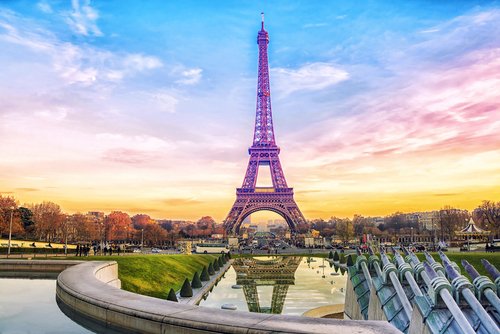
Things to remember
Learn some lingo
Try learning a bit of French when travelling to France. A little bit will go along way – it will be seen as polite, and will be appreciated. It may also come in really handy. If you head out of major cities, it is likely that people will speak little or no English.
Think about when you drive
France is notorious for traffic building up on certain days during the year. The first day of the school holidays, for example, is usually a day when lots of French people decide to go away.
Prepare for the tolls
Most major motorways are toll roads, so be ready to pay these and figure out how much the charges may add to your trip.
Opening hours
Most shops and supermarkets are closed on Sundays. This will vary a bit depending on the season and the area, but the general rule of thumb is get what you need on a Saturday. Many cultural sites are shut on some weekdays too (often Tuesdays) so always check before you just turn up somewhere.
Restaurants
These will also often shut during the middle of the day, so don’t bank on a late lunch. Look for a ‘non-stop’ sign in the window if you really want to work around France’s schedule. This means the restaurant won’t close. Our advice? Embrace the quiet. Use 12- 3pm as a time to chill out and recuperate before the cities get lively again.
Tipping
Tipping is not required in France, however that doesn’t mean that you shouldn’t. Restaurant bills will include service (service compris) so there is no need to go overboard unless you feel strongly that the experience was exceptional. However, it’s good to acknowledge good wait staff, as is the custom in most countries.

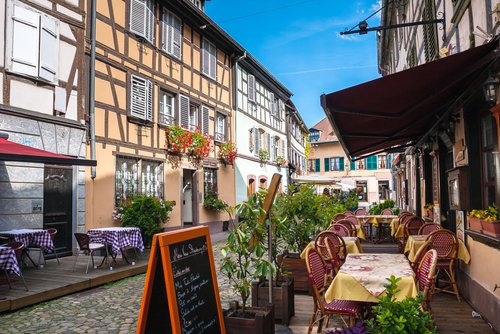
Gastronomy
One of the top three countries in the race for most Michelin stars, France knows how to do food.
Cheese and wine
When it comes to cheese, you can tour the country sampling each province’s offerings. Taste the powerful characteristics of Roquefort in the South and the warm and chewy nature of Camembert in the North.
Whether you prefer the crisp grapefruity flavours in a glass of Sauvignon Blanc, or the rich and mellow tones of a Pinot Noir, you will find cellar and vineyard tours across France’s spectacular regions.
Region by region
Provence
Marseille’s bouillabaisse is a classic French dish. A tomato-based broth filled to the brim with chunky, fresh seafood. Ratatouille is also a local specialty.
Gascony
Duck confit. The technique of cooking and preserving duck in fat was originally invented to sustain people through the winter, but it was so delicious that it’s remained one of France’s most prominent dishes.
Brittany
It’s a toss up as to whether crepes are the most famous food from Brittany, or moules mariniere. Both of them are not to be missed.
Auvergne
This mountainous region of France grows lots of fruit and vegetables, including blueberries. Tarte aux Myrtilles is an irresistible blueberry pie which comes from these beautiful hills.
Picardy
The leek-filled quiche, Flamiche aux Poireaux, is a specialty from Picardy.
Driving in France
Our top tips for driving in France
If you are thinking about doing a French road trip, why not consider one way car rental? These means that your journey doesn’t have to loop back to your initial destination, and you can drop your rental off at a different point.
Speed limits change in France depending on the weather (sensible, really). Bear this in mind, make sure you know what the speed limits are and adjust accordingly if road surfaces are wet.
Headsets and headphones are not permitted whilst driving, and fines are handed out for using them.
If you are journeying a fair distance, make use of a few villages étapes on the way. These are towns specifically designed for catering for people making a long journey. They are, in essence, really nice service stations with far more amenities. You can expect a range of shops and restaurants, a hotel, an information point and a picnic area.
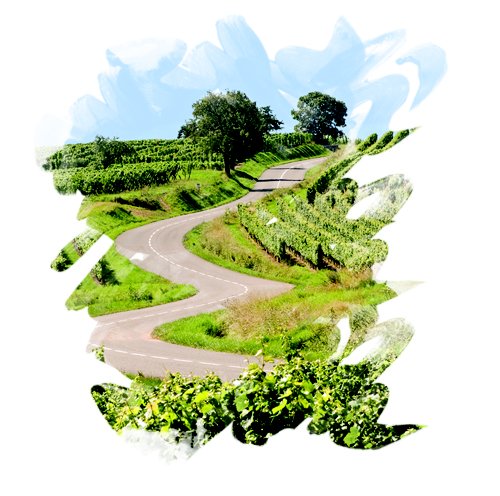

The best of France

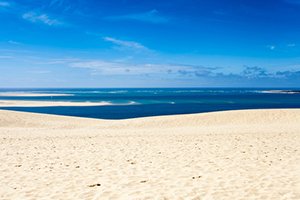
Beaches
The south coast is well-known for its beaches. There are hundreds to choose from, but even now there are still some areas which are off the mainstream sightseer’s radar. Argeles Plage, tucked behind the Pyrenees, is a long ribbon of sandy beach where it’s easy to find a secluded spot even in peak season.

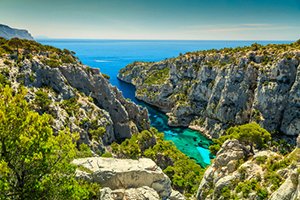
National parks
For an especially glorious stretch of cliff-lined coastline, visit Parc National des Calanques. There are many ways to navigate this region, from hiking the cliff tops and boating to beaches which cannot be otherwise accessed. Divers and snorkelers also revel at the prospect of witnessing the magical underwater forest below.

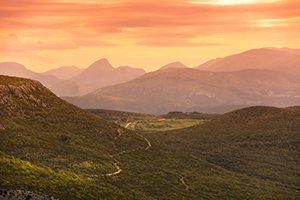
Mountains
Those dreaming of snow-capped mountains might prefer the Savoy Alps region, which is home to Mont Blanc on the Italian border, the beautiful town of Annecy and Lake Geneva.
A bit of everything
The Dordogne boasts vineyards, forests, limestone hills, medieval towns, sensational chateaus and prehistoric cave paintings.
Book your France car hire now
 Book by phone
Book by phone
+44 203 3186 960








